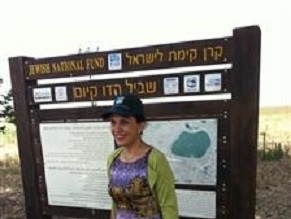|
World Jewish News

As part of her Israel tour, Bulgarian MEP Antoniya Parvanova visited the Dalton-Gush Halav Coexistence Trail, located near the border with Lebanon, which connects two communities, one Jewish and one Arab
|
Bulgarian MEP: 'We should start a closer cooperation between the European Parliament and the Knesset'
13.06.2013, Israel 'We should start a closer cooperation beteween the European Parliament and the Israeli Knesset because this will allow us to better understand the work that is done in Israel and make it easier for my colleagues in the parliament not to be misled by campaigners,’’ MEP Antoniya Parvanova told Knesset Speaker Yuli Edelstein during a meeting in Jerusalem.
The Bulgarian MEP, who is Vice-President of the Liberal group, was on a four-day tour in Israel as guest of KKL-JNF, the largest Jewish environmental organisation. She toured several environmental and water management projects, and as a former medical practicioner also visited the Ichilov hospital in Tel Aviv.
‘’I proposed to Mr Edelstein that we should initiate a project to exchange experts, assistants and members of the secretariats of the two parliaments. This will help to build a better cooperation between the two institutions,’’ she told European Jewish Press (EJP).
The President of the European Parliament, Martin Schulz, is expected to make an official visit to Israel in July.
According to Parvanova, ‘’there in the European Parliament a tendency to rely on external sources, on campaigns which are affecting crucial issues for the region. What is really worrying me is that these external sources are not always objective. That’s why I would prefer the parliamentarians to talk to each other directly because they are elected, they are responsible, they are accountable to the people, instead of becoming misled by campaigners serving other causes.’’
She continues : ''As politicians we know how things differ from the reality and how information can be manipulated. That’s why there are many projects, like the European project itself, where politicians from different member states are working together. Another example is the Union for the Mediterrean and its parliamentary assembly where people from different cultures, countries, nationalities are working together to better understabnd each other, to develop common projects. The same for the Council of Europe where politicians from different countries, who are concerned about important issues, are talking to each other. Instead of always running after external sources and listening to unreliable sources, it’s better to talk to each other : this will create trust, base for cooperation and give us a chance to build and not to fight, not to lose opportunities but rather create opportunities.’’
Parvanova, who is a member of the European Parliament’s ’ENVI’ committee (Environment, Public Health and Food Safety), believes that Israel should do more to actively promote its achievements for example in hich-tech, environmental issues, nano-technologies, modern agriculture, medecine, communication…
''There is a lack of information and a lack of explanation on what’s going on,'' she says.
''But when there are ‘accidents’, conflicts, there is a need for more information from Israeli officials. This will help us because when something is happening we are learning it from the media or from anti-Israeli organisations.’’ ‘’It’s very difficult to understand the truth. The State of Israel and Israeli officials have alwatys to defend themselves against misled information. Then there is no explanation. There is a need for active communication because there is a lot of money put in strategies to discredit the State of Israel and of course to deligitimize it.’’
‘’We are democratic countries and Israel is also a democratic country. We should use the tools of democracy. I hope that this will help create friends of the State of Israel in Europe,’’ she adds.
Her visit to a KKL-JNF project in Israel’s Upper Galilee region made her even more convinced that people from different ethnicities, cultures and religions ‘’can work and live together and build a better future.’’
The Dalton-Gush Halav Coexistence Trail, located near the border with Lebanon, connects two communities, one Jewish and one Arab, and brings together the people who walk along it as they meet every day and get to know one another.
''If more projects like this will be developed, it will be beneficiary for everybody because the two ethnicities are dreaming to have a better life especially for their children. This is what should be invested and such projects should become pilot projects that need to be shown and exchanged as best practices in the region. If simple people will be helped to develop projects, the fight of the politicians will become unreasonable and not interesting anymore. People will choose peace and prosperity instead of following political games and fights,'' says Parvanova who also believes that by cooperating on environmental matters ‘’we can solve political conflicts in the region.’’
by: Yossi Lempkowicz
EJP
|
|
